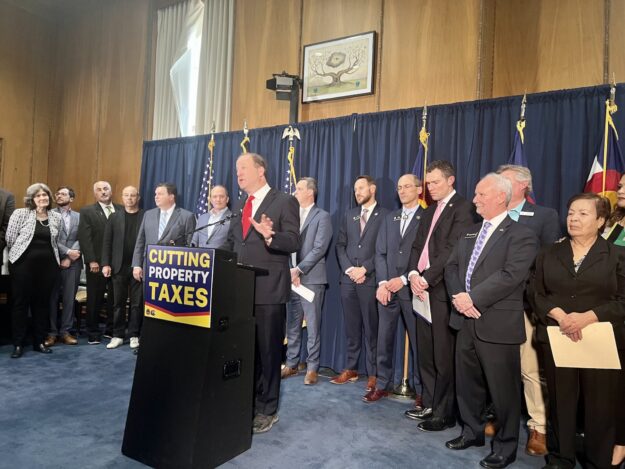Widgetized Section
Go to Admin » Appearance » Widgets » and move Gabfire Widget: Social into that MastheadOverlay zone
Polis proposal to cut looming property tax hikes would reduce TABOR refunds

Colorado Gov. Jared Polis unveils a plan to curb rising property taxes on May 1, 2023, at the Capitol. (Sara Wilson/Colorado Newsline)
Colorado voters could be deciding this November whether to approve a 10-year plan to prevent a rapid increase in property taxes.
Gov. Jared Polis and Democratic lawmakers unveiled a proposal Monday that would shrink the taxable value of people’s homes, reduce the residential assessment rate, cap the growth in district property taxes at inflation, and expand the state’s senior homestead exemption.
“What people in our state want to see is how do we have predictability and lower property taxes into the future? This does that for a decade,” Polis said.
As property values in Colorado skyrocket, so does the annual tax burden for homeowners and businesses. The average home in Colorado is currently valued at about $600,000 and is expected to increase to $780,000 this year, according to an analysis from the governor’s office. If voters approve the governor’s plan, that average homeowner could expect to see a tax increase of $406 versus an increase of $834 without the new plan in place.
In 2020, Colorado voters repealed the Gallagher Amendment, which required local property tax rates to adhere to a certain formula. Last year, the Legislature approved temporary property tax cuts for two years. Polis wanted to find a longer-term solution this session.
Under the plan, voters will decide whether to cap the growth in property tax collections equal to the rate of inflation, excluding school districts. It would also reduce the taxable value of primary residences by $40,000 and reduce the residential assessment rate for primary residents from 7.15% to 6.7% until 2032. The non-residential assessment rate would also be reduced over 10 years.
Polis and Democratic lawmakers say these tax reduction measures will not affect funding for school districts, fire districts, water districts, hospital districts and other local services.
A formula that applies to the state Taxpayer’s Bill of Rights, which contains a revenue and spending limit that can increase according to inflation and population growth, would be adjusted to allow the state to retain 1% of revenue surplus, or about $167 million in 2024, according to the governor’s office. Taxpayer refunds for that year would be lessened by $46.
“What I believe we found with this piece of legislation is a responsible and balanced approach that both delivers the property tax reduction that people are going to need in order to keep up with the high cost of living without undercutting the ability of our local governments to keep up with their critical services,” Rep. Chris deGruy Kennedy, a Lakewood Democrat, said.
The bill’s main sponsors will be deGruy Kennedy, Senate President Steve Fenberg of Boulder, Sen. Chris Hansen of Denver, Rep. Mike Weissman of Aurora, all Democrats.
The legislation, which hasn’t been introduced, will need to sprint through the Legislature, which adjourns for the year on May 8. To get the measure on the ballot, it will need a simple majority vote. Democrats hold large majorities in both chambers.
Editor’s note: This story first appeared on Colorado Newsline, which is part of States Newsroom, a network of news bureaus supported by grants and a coalition of donors as a 501c(3) public charity. Colorado Newsline maintains editorial independence. Contact Editor Quentin Young for questions: info@coloradonewsline.com. Follow Colorado Newsline on Facebook and Twitter.


